Jennifer participates in a Falun Dafa parade in Bendigo Australia, in 2002 or 2003. 曾錚2002或2003年在澳大利亞本迪戈(Bendigo)參加法輪大法社團的唐裝遊行及表演。
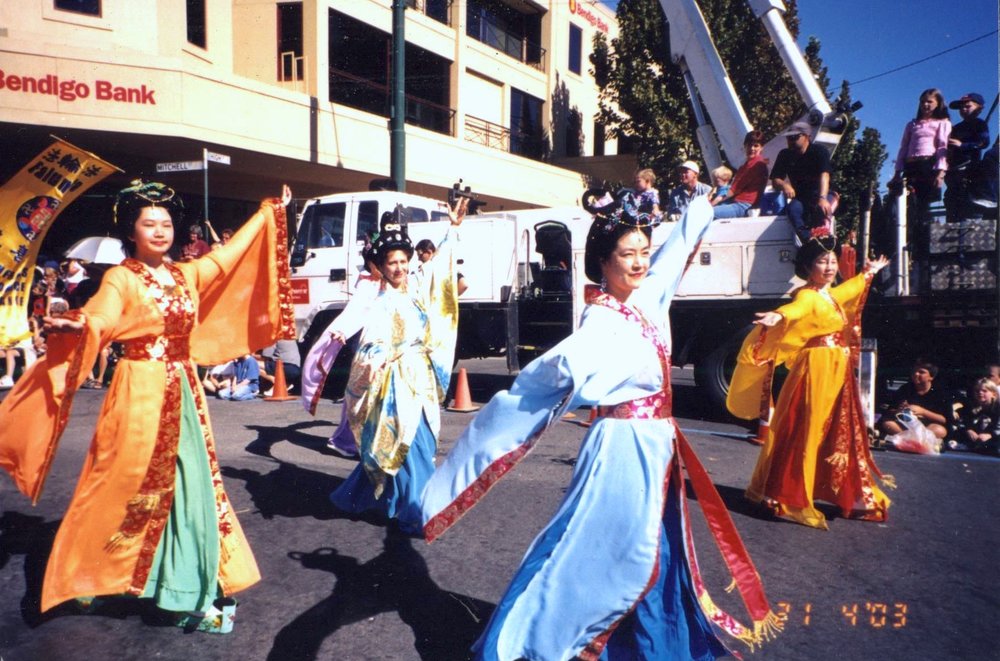
Jennifer participates in a Falun Dafa parade in Bendigo Australia, in 2002 or 2003. 曾錚2002或2003年在澳大利亞本迪戈(Bendigo)參加法輪大法社團的唐裝遊行及表演。

March 5, 2019 Updated: March 5, 2019
WASHINGTON—For the first time ever, persecuted faith groups in China and human rights organizations are forming a coalition to advance religious freedom in China, with the backing of the Trump administration and members of congress.
Sam Brownback, U.S. Ambassador at Large for International Religious Freedom, and Rep. James P. McGovern (D-Mass.), the newly appointed chairman of the Congressional-Executive Commission on China (CECC) and co-Chair of the bipartisan Tom Lantos Human Rights Commission, joined representatives from persecuted faith groups in China. They vowed to advocate for and defend religious freedom in China at a press conference announcing formation of the Coalition to Advance Religious Freedom in China (CARFC) in Washington on Mar. 4, 2019.
Brownback said, “I am here to add the administration’s support.”
“We are deeply concerned by the Chinese government’s tightening restrictions on religious practice, including for Protestants, Catholics, Tibetan Buddhists, Muslims, the Falun Gong and others,” Brownback said.
Brownback pointed out that in recent years new regulations were implemented to penalize all unregistered religious activities, including foreigners’ religious activities.
“We are here today to give you a chance to hear from the groups that are affected by these actions, and to officially recognize the launch of the Coalition to Advance Religious Freedom in China by the International Religious Freedom Roundtable.
“We believe religious freedom is a universal human right…It is a fundamental right. Our country was founded on it. It is in the Chinese Constitution. It is in the UN Charter, the Declaration of Human Rights. We believe that every person around the world should be free to believe or not to believe, as they see fit.”
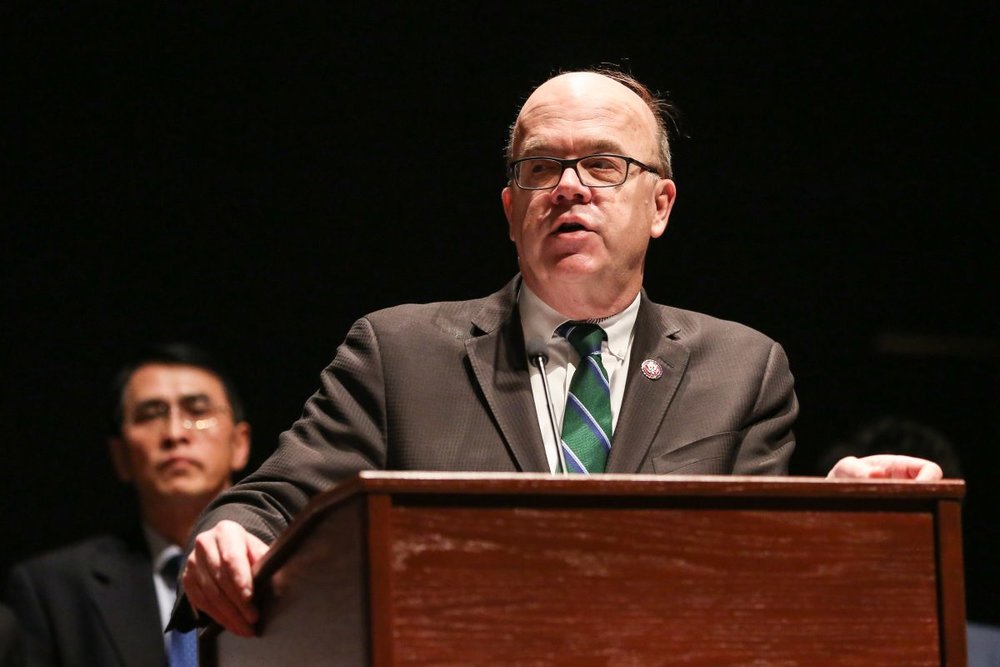
Rep. James P. McGovern (D-Mass.), co-Chair of the bipartisan Tom Lantos Human Rights Commission and chairman of the Congressional-Executive Commission on China (CECC) , speaks at the press conference to announce the Formation of The Coalition to Advance Religious Freedom in China (CARFC) at The Congressional Auditorium in the Capitol Visitor Center, Washington, on Mar. 4, 2019. (Jennifer Zeng/The Epoch Times)
McGovern said he was happy to see that so many organizations have decided to come together, transcending cultural, ethnic, and doctrinal differences, to work hard on religious freedom of China.
McGovern said he came to show support, “to reiterate my commitment to do all I can as a member of congress to help bring the persecution to an end.”
“Last week the speaker of the House of Representatives Nancy Pelosi re-appointed me as the co-chair of the Tom Lantos Human Rights Commission, and newly appointed me as the chairman of the CECC. So I have some tools on hand, and I plan to use them to the best of my ability. ”
McGovern said he would do everything he could not only to raise the visibility of human rights violations in China, but also to help Americans understand why what happens in China matters.
Noting that 2019 is the 20th anniversary of Falun Gong’s persecution in China, McGovern said to reporters, “The issue of Falun Gong is something we care very deeply about. We are going to explore options in the month ahead.”
Former Congressman Frank Wolf (R-Va.) made a passionate speech, calling for special attention be paid to the 100 plus Confucius Institutes in U. S. universities, as well as to western companies that sell products to China that fuel human rights abuses.
He said, every college that has a Confucius Institute should invite Catholic priests, Protestant pastors, Uyghurs, Tibetans, and Falun Gong practitioners to speak, “and if they do not do that, they should be removed from the campus.”
Greg Mitchell, chair of the International Religious Freedom Roundtable, said that Congressman Wolf, Ambassador Brownback and others had been recommending for quite a while that all the persecuted groups be united and become “one unit, one team and speak with one voice… and we are finally doing it now.”
“By forming a Coalition to Advance Religious Freedom in China, persecuted faith communities again unite their voices in support of religious freedom for all in China.”
Mitchell said that the coalition was still in its initial stage. They expect more groups to join, and they are going to organize more activities to “try to put pressure on the U.S. government to take further concrete actions, to put sanctions on China.”
Mitchell believed that the coalition would have a strong impact as a united force.
As one of the coalition members, Louisa Greve, director of External Affairs, Uyghur Human Rights Project, laid out some concrete steps to take, including “urging the use of the Global Magnitsky Act to hold Chinese government officials responsible for the well-documented campaign of oppression targeting Uyghurs and other ethno-religious communities in the Uyghur Region,” and passing the Uyghur Human Rights Policy Act and the Uighur Intervention and Global Humanitarian Unified Response Act.
Dr. Han Lianchao, vice president of Citizen Power Initiatives for China, called for a tougher stance against Huawei and China Electronics Technology Group, which helped the Chinese Communist Party (CCP) to establish a surveillance system throughout China that was worse than what had been described in Orwell’s “1984.”
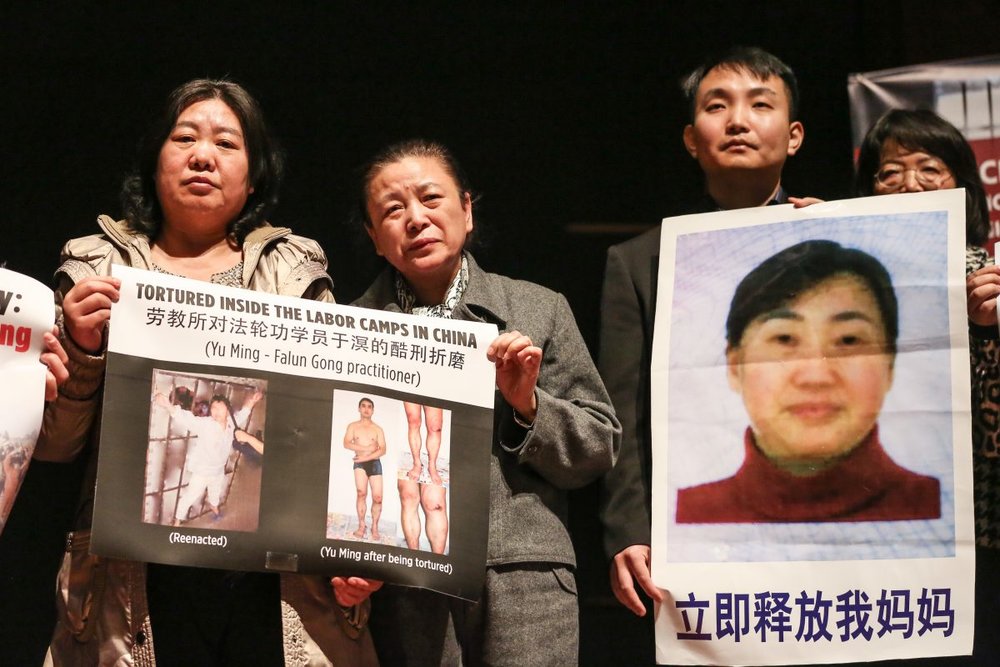
Falun Gong practitioners of Washington hold pictures of family members or lawyers still imprisoned in China for practicing Falun Gong or defending Falun Gong at the at the press conference to announce the Formation of The Coalition to Advance Religious Freedom in China (CARFC) at The Congressional Auditorium in the Capitol Visitor Center, Washington, on Mar. 4, 2019. (Jennifer Zeng/The Epoch Times)
Representatives from several persecuted faith groups shared their experiences.
Li Kunrui, former police officer in Dalian City in China, said that the police had an arrest quota to meet when the CCP decided to crackdown on religious groups. Sometimes when the police could not arrest enough people, they had to seek help from other police stations that had arrested more than their quota.
Li said that police often used hotel rooms to detain and torture people, as they didn’t have to abide by legal procedures there, such as recording the interrogation process, as required by law. So in the hotel rooms the police could torture people madly.
Kuzzat Altay, Founder & President, Uyghur Entrepreneurs Network, said that he had lost contact with his 67-year-old father in Xinjiang since last February. The last voice message his father sent to him was, “Son, they are taking me.”
Altay said he didn’t know whether his father is still alive or not, as he had health problems. Altay’s 70-year-old aunt had already passed away in the re-education camp.
Altay said, “according to us, there are at least 3 million people in the concentration camps.”
Altay said that the CCP’s claim that the Uyghurs are in the camps for vocational training was a sheer lie. People like Tashpolat Teyip, former president of Xinjiang University and Halmurat Ghopur, president of Xinjiang Medical University, are detained in the camps. These people don’t need any vocational training at all.
Altay said his best high school friend was taken to the hospital for a blood and urine test. Since then his family had lost track of him, and they worry that he could have been killed for his organs.
Altay said that since there were not enough camps to hold all the Uyghurs, CCP officials now are living inside the Uyghur homes to monitor them. Some Uyghur girls have been raped; some “willingly” married those officials in order to save their families.
Bhuchung Tsering, vice president of International Campaign for Tibet, said that since 2009, 155 Tibetans have set themselves on fire to protest the CCP’s cultural and religious genocide.
Yu Ming, a Falun Gong practitioner and a businessman who escaped from China at the end of 2018, spent nearly 12 years in jails and labor camps. He said he was repeatedly stripped naked by 6-7 policemen and shocked with 300,000 volt high-voltage batons. He was once tied onto an iron chair for three months. The police used an awl and toothpick to prick his nails as part of the effort to force him to give up his belief.
When Yu Ming and Sean Lin, representing the Washington Falun Dafa Association, spoke on the stage, a dozen other Falun Gong practitioners stood behind them, holding photos of family members or lawyers who are still jailed in China, either for practicing or defending Falun Gong.
Source: https://www.theepochtimes.com/us-supports-forming-coalition-to-advance-religious-freedom-in-china_2825924.html
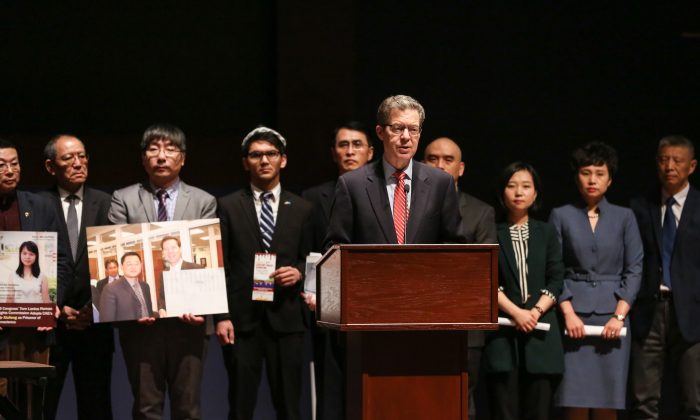
Sam Brownback, U.S. Ambassador at Large for International Religious Freedom, speaks at the press conference to announce the Formation of The Coalition to Advance Religious Freedom in China (CARFC) at The Congressional Auditorium in the Capitol Visitor Center, Washington, on Mar. 4, 2019. (Jennifer Zeng/The Epoch Times)
【大紀元2019年03月01日訊】(英文大紀元記者Jennifer Zeng報導,穆清編譯)于溟,一位成功的中國商人,在面對來自故土不公正的遭遇後,他試圖向世界講述他所經歷和看到的一切。
為了揭露中共在奧運會籌備工作中的人權迫害和酷刑,他精心策劃逃離勞教所,聽起來像是好萊塢的驚險片;他撰寫文章,揭露監獄製作盜版書、竊取國外作家的知識產權;他與中國的人權律師合作,在中共法院提告江澤民、要求索賠;逃往美國後,他現在公開講述自己的故事。
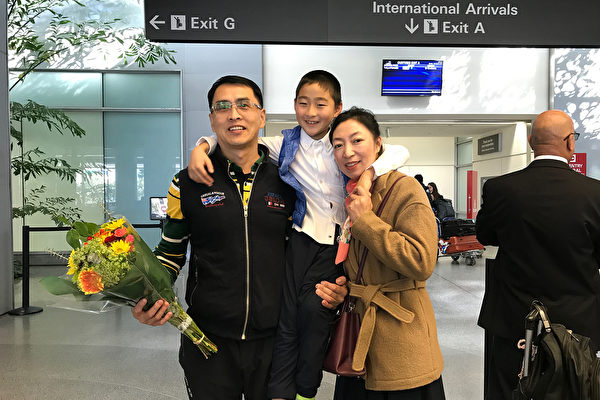
2019年,1月27日,于溟抵達舊金山國際機場與妻子和兒子團聚。(The Epoch Times)
2008年8月初,當全世界驚嘆北京盛大的奧運會開幕式時,35歲的企業家于溟卻被關在臭名昭著的馬三家勞教所附屬醫院內,他剛剛經歷了長期的酷刑折磨。
他被高壓電棍長期電擊和毆打。三個月來,他一直被關在一個特製的鐵籠子裡,既不能站立,也不能躺下睡覺。記得有一次,他被警察故意拽下樓,臉朝下,他的頭被狠狠地敲在每一級台階上。
這是他第三次因修煉法輪功而被監禁,從1999年7月至今,法輪功一直在中國受到共產黨的迫害。
1996年,于溟通過一位客戶開始修煉法輪功。客戶將法輪功最主要的一本書《轉法輪》送給了他的妻子。
那時,于溟已經是中國東北遼寧省會瀋陽市的一名成功企業家。他的時裝公司有100多名員工,並間接帶動6家國有供應商,吸納了1000名員工就業。
剛開始,他的客戶和他的妻子都認為于溟不是那種對修行,精神追求感興趣的人,他們沒有給于溟看這本書。但是,他們越不想讓于溟看見,于溟越想弄清楚這本書究竟是什麼。
於是,于溟從他的妻子那裡拿到了《轉法輪》,並一晚上讀完了書中的六講內容。第二天早上,于溟開始在公園裡尋找到一個法輪功煉功點,學習煉功動作。
法輪功,又稱法輪大法,包括五套功法,遵循真、善、忍的修煉原則。對習練者在改善身體健康、減少壓力方面有突出效果,同時也有助於改善與家人和同事的關係,領悟生命的意義。
1992年,法輪功創始人李洪志先生公開面向社會傳授法輪功,人們通過口耳相傳,在中國迅速傳開。到1999年,媒體報導中國有一億人修煉法輪功。
法輪功的受歡迎程度引發了當時的中共黨魁江澤民的不安和妒忌,他害怕民眾做共產黨控制之外的事,他也害怕中國人發現法輪功的傳統道德教義(真、善、忍)比基於唯物主義,無神論和階級鬥爭的共產主義意識形態更具吸引力。
從1999年7月起,江澤民調動所有國家資源鎮壓法輪功。這些政策和迫害手段直接導致了2008年,于溟在遭受酷刑迫害後、臥床不起。

于溟曾被中共勞教所關在類似這樣的鐵籠裡,不能站,不能坐,長達三个月(明慧網)
2008年,隨著北京奧運會的臨近,于溟看到越來越多的人被送到勞教所,罪名是「計劃搶劫」或「準備偷竊」。
當時大紀元報導,中共為確保奧運會前北京的「安全」,將超過300萬人趕出首都,超過6萬間房屋被拆除,超過100萬人被送進勞教所。
在勞教所,中共為「轉化」法輪功學員——迫使他們放棄信仰,加重酷刑和迫害,逼他們效忠於共產黨。
于溟無法忍受親眼看到無辜的人遭受如此嚴重的折磨。他想,在北京獲得奧運會舉辦權後,外界應該知道中國發生的事:共產黨政權沒有如國際社會所期望改善中國人權,反而為辦奧運會迫害甚至殺害老百姓。
于溟決定揭露這些。
但如何做? 他作了一個大膽的計劃。
按照他的計劃,將有兩名法輪功學員逃離勞教所,隨後與在北京採訪奧運會的外國記者聯繫,把中國勞教所的情況告訴外界。
在醫院較鬆的監控下,于溟想辦法獲得了手機、一些錢,還有一把鋸子,這是最重要的一個工具。
經常,勞教所的囚犯會被送往醫院,然後再被送回勞教所。于溟通過他們悄悄傳信和祕密溝通,協調了這次醫院出逃。
于溟還聯繫了在外面接應的人,還找人租了一處地方藏身,因為他預計警察會進行瘋狂搜捕。
除此之外,還有一件事要考慮:在兩名法輪功學員逃脫後,值班警察和同一牢房的22名囚犯肯定會受牽連和嚴懲。
作為一個遵循「真、善、忍」教義的人,于溟不希望這種情況發生。他想善待這些不知情的人。
所以他設法弄到一些安眠藥。他告訴醫生他睡不著。當拿到安眠藥後,他會在護士眼皮底下吞下安眠藥,但實際上變戲法地把藥藏在另一隻手上。
就這樣,他一點一點攢夠了藥,在越獄那天,讓所有囚犯和守衛在牢房裡睡過去,這樣他們就不會受牽連而被追責。
2008年8月11日,于溟的計劃正式實施。牢房窗戶的鐵條被砍斷,兩名法輪功學員順著用被單擰成的繩子從三樓下到地面。
一切進展順利。他們在正確的時間、正確的地點被正確的人接走⋯⋯但第二個負責租房的接頭人始終沒有出現。
沒有人知道哪兒出了錯。于溟不得不安排他的妻子馬莉去接這兩個人,並把他們藏在自己家中,儘管他很清楚這太冒險了。
果然,三天後,數百名警察,其中一些人手持槍枝,圍住了于家的整個住宅區,並帶走了兩名逃亡者以及馬莉。
在北京奧運會期間,這個幾乎成功逃離「模範」勞教所的案子,把共產黨政權的最高領導人逼瘋了。這次越獄被列為「重大事件」;至少7名警察被解僱,兩名勞教所的副主任受到懲罰。
于溟和逃脫的兩名修煉者遭到了凶惡的嚴刑拷打。
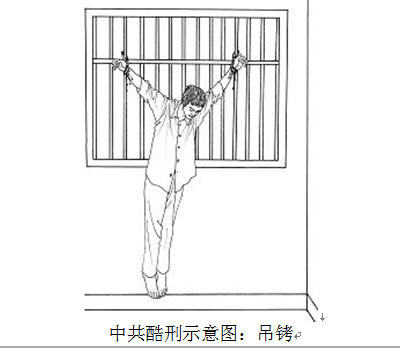
(明慧網)
于被吊在門上,兩隻胳膊被張開,而雙腳幾乎不能沾地。他就這樣被掛了一個多月。有時,當他要上廁所時,他才被放下來一會兒;有時,他要上廁所,警察也不把他放下來。所以,他只好儘量減少進食。通常,食物或水都是警察直接塞進他的嘴裡。
他差點因此死掉。
「另外兩人被折磨得更厲害。」于溟說,「勞教所在事發後給這兩名越獄者下了『死亡指標』,意思是勞教所可以在不追究責任的情況下任意對兩人進行刑訊逼供。」
于溟於2009年9月2日被釋放。如果他沒有計劃逃跑,他可能在大約20天內就會被釋放。
在這越獄經歷後,三位法輪功學員除了遭受近乎致死的折磨之外,每個人都被勞教所加期關押一年。
當被問及這次嘗試是否值得,于溟毫不猶豫地回答:「是的,值得。我們必須這樣做。迫害這些年,我身邊的十多名法輪功學員已被折磨致死。你怎麼衡量這些生命的價值?對冒著生命危險來阻止更多的殺戮,我從未後悔過。」
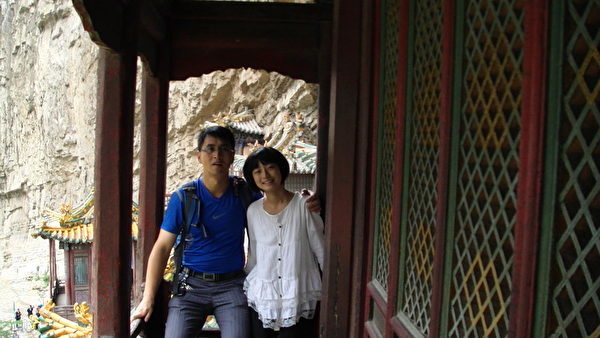
于溟和女兒在中國(馬利提供)
中共的勞教所不僅強迫良心犯背棄信仰,同時也利用他們賺錢,良心犯是無成本的勞動力。
于溟回憶他和其他人是如何被迫在勞教所複製哈利波特的書籍。
他說:「這是2001年年底、中國加入世界貿易組織後不久。我被拘留在北京團河勞教所。我們被迫裁剪、摺疊、整理和裝訂《哈利波特》,還有其它書,中英版都有,還有其它語種。這些書是在別的地方印刷,等我們把它們裝訂好,再就拿走了。」
于溟和第6隊所有被關押的犯人裝訂這些書,一共做了三個多月。
于溟記得在那個時候,在6大隊的大廳到處都可以看到堆成一米高的印刷品,走廊裡也隨處可見。3大隊和5大隊也在做這些書。
有人偷偷地把印好的紙張送到勞教所,來搬運印張的車輛看起來很破舊。印刷質量極差:紙張看起來很黃,到處都有印刷錯誤和痕跡。
為了在中國新年前準備更多的書,在寒假期間賣給學生,警察強迫被關押者工作很長時間,甚至通宵工作,不給他們任何報酬。
于溟估計,在這幾個月裡他們可以製作出幾十萬份這樣的盜版書。
于溟表示,他早在2004年就寫過一系列文章揭露了這一點,他希望哈利波特的作者JK羅琳(J. K. Rowling)或書籍的授權出版商能看到、並進行調查,保護作者和出版商的權益,當然也包括被拘留者的權益。
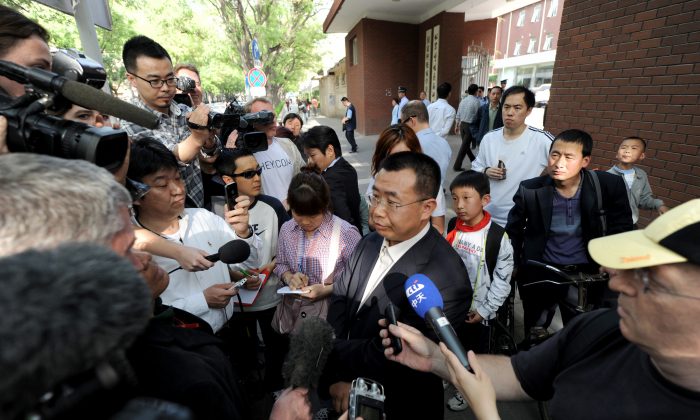
2012年5月2日,外國記者在北京採訪了中國維權律師江天勇。(Mark Ralston/AFP/Getty Images)
自2009年以來,于溟第三次獲釋後,開始與一些中國維權律師合作,這些人權律師為被非法關押的法輪功學員提供辯護。其中有王全璋、王宇、董前永、江天勇等人。
2013年8月29日,于溟在參加侄子的婚禮時第四次被捕。當時,瀋陽市十多名其他法輪功學員也被抓。
因為瀋陽市要開第十二屆大學生運動會,中共領導人將前往瀋陽,當地警方抓捕法輪功學員是所謂的「預防措施」,以防止領導人視察期間發生任何抗議或上訴。
得知于溟被捕後,曾與他合作的幾名律師也開始著手處理他的案件,但他還是被判處四年徒刑。
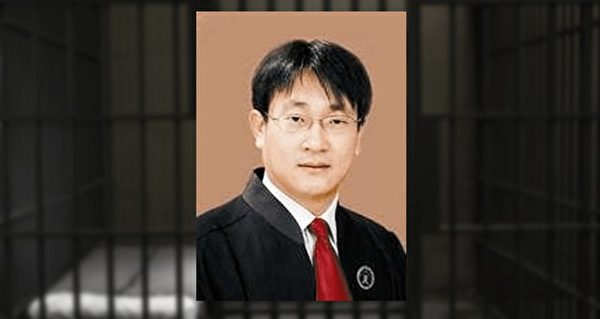
積極從事公益活動,為弱勢群體和法輪功學員發聲的人權律師王全璋被中共冤判四年半監禁(公有領域)
2015年7月9日,他的律師王全璋、王宇、董前永被非法抓捕,幾乎同一時間,中國有200多名中國律師和人權活動家被捕。
在服刑四年後,于溟在2017年獲釋。2018年年底,他設法逃到泰國,在那裡他獲得了前往美國的簽證。他的妻子已經從美國政府獲得了難民身分。
2019年1月27日,在中共的監獄累積遭受了近12年的酷刑迫害後,于溟終於在舊金山和他的妻子、兒女團聚。然而,就在他獲得自由的同一天,他的律師王全璋在被祕密拘留了三年多之後,被判處四年半監禁。
為王全璋辯護的律師余文生目前也被拘留在徐州看守所。
作為很多事情的親歷者,于溟表示,中共媒體的很多宣傳都是假的。
他說,公眾不知道2015年4月22日,中共中央電視台(CCTV)播放的法庭審判背後究竟發生了什麼。
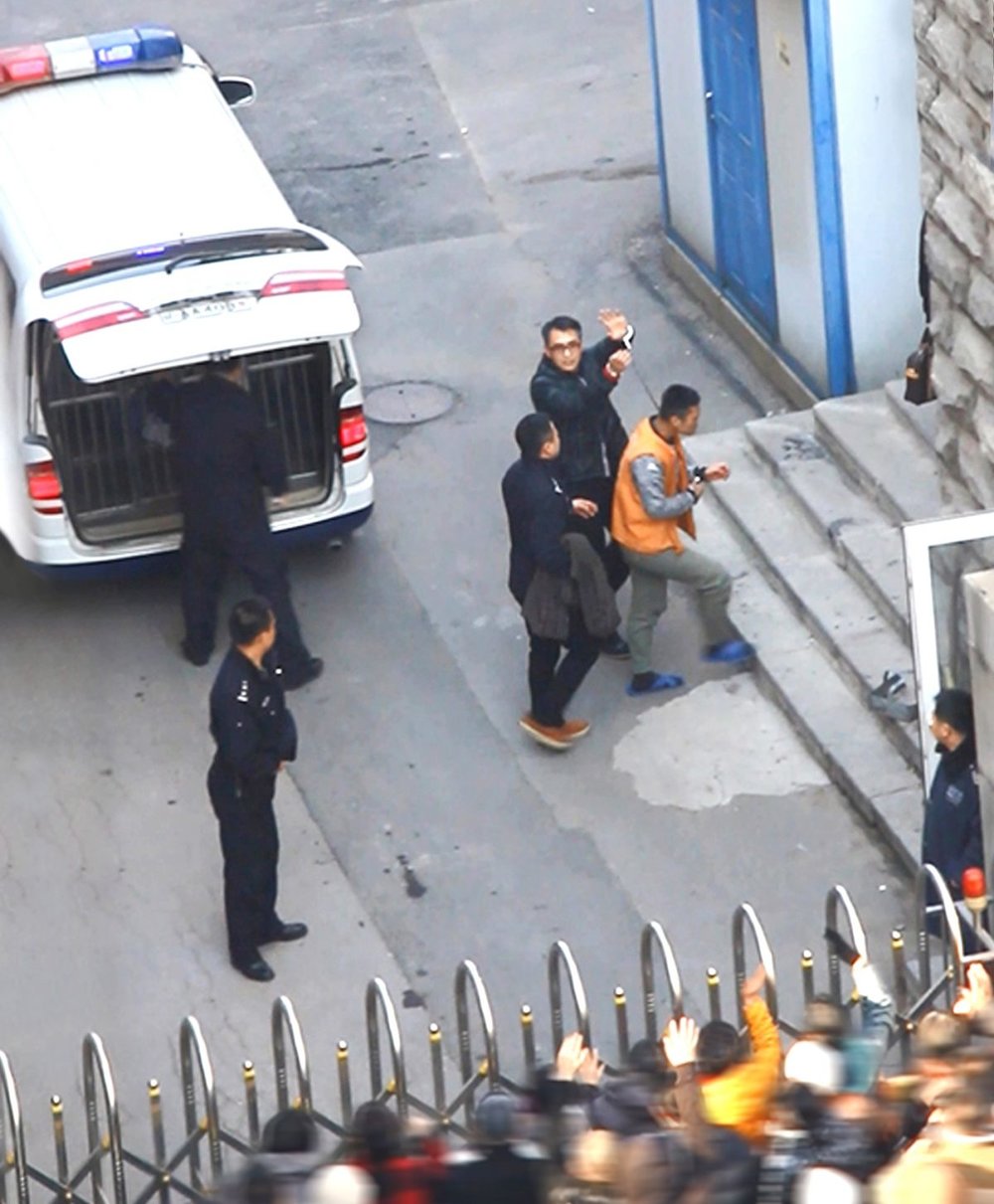
二零一四年十一月十八日上午近十點,一輛車號為「遼AA408警」的車駛入瀋陽市瀋河區法院的後門,被非法關押一年多的瀋陽法輪功學員于溟下車後,向圍觀人群揮手示意,他表示修煉法輪功無罪,因此拒穿看守所的黃馬甲。(明慧網)
當天,中央電視台的編輯歪曲報導了視頻內容,並誹謗人權律師王宇。
那天受審的是一位女法輪功學員李東旭,她當時與于溟一起受審。當李試圖談論她的案子時,法警重重地將她撞倒、並將她押到座位上。
李東旭84歲的母親無法忍受看到她的女兒受到這樣的對待,她站起來抗議。
法警想要對這位84歲的老人動粗,律師王宇離開座位去阻止他們的暴力。當她憤怒的譴責警察施暴後,王律師被拖出法庭。
中央電視台當天的新聞卻報導了一個完全不同的故事。經過對審判錄像的精心編輯,央視製作了「新聞」片段,指王律師多次離開座位、製造「麻煩」,並在法庭上大呼小叫。
「人們很難想像中央電視台播出的畫面背後是什麼,」于溟說。「讓我感到難過的是,我在泰國和美國待的時間很短,但我卻在這些地方多次看到中央電視台的節目。在中國,我從未見過任何美國或泰國的電視節目。」
「我想總統川普(特朗普)在貿易談判中堅持『對等』是非常正確的。我希望同樣的原則也能適用於傳媒界。」
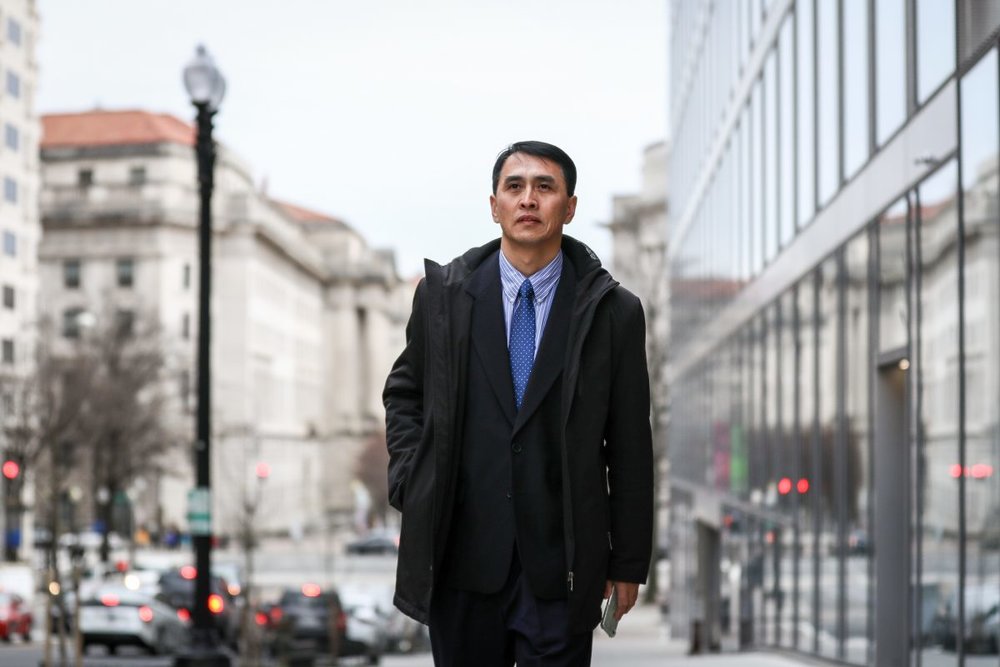
經歷近12年冤獄後,于溟於2019年1月底到達美國與家人團聚。(Samira Bouaou/The Epoch Times)
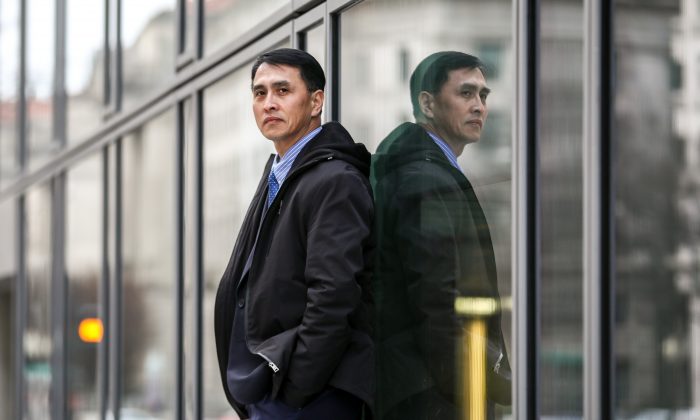
經歷近12年冤獄後,于溟於2019年1月底到達美國與家人團聚。(Samira Bouaou/The Epoch Times)
責任編輯:劉潁
轉載自:http://www.epochtimes.com/b5/19/2/28/n11080422.htm
When a person is hurt, a layer of invisible “shield” could grow in his/her heart and separate him or her from the world. In order not to be hurt again, he/she may choose to keep a distance from others.
人受傷害之後,會在心中生出一層厚厚的保護膜,將自己與世界隔絕,讓內心變得冷漠——爲了怕再受傷害,乾脆不再靠近他人。
As a result, he/she imprisons himself/herself within his/her shield.
這樣,這人無形中已經將自己囚禁了。
I need to break this invisible shield and prison.
我要打破自己的這座牢籠。
I want to be warm and loving again.
我想成爲一個內心溫暖,不再防范別人與這世界的人。
最近,澳洲昆士蘭州一名部長級人物因為接受兩個富商的秘密捐款沒有申報,而被判處七年徒刑,在澳洲社會引起轟動。這是一個典型政府官員腐敗案,然而跟中國的腐敗比起來,又可謂「一樣腐敗 兩種光景」了。
澳洲的這起部長級人物腐敗案本身并不複雜。被判七年的「故事主角」是納佗(Gordon Nuttall),今年56歲,2005年因醜聞被迫退休前,曾擔任過昆士蘭州工業關係部部長、衛生部部長及第一產業及漁業部(Minister for Primary Industries and Fisheries)部長等職務。
2006年,昆士蘭州「罪行及不當行為調查委員會(Crime and Misconduct Commission)」開始了對納佗的調查。2007年,委員會指控他秘密接受大礦業主坦爾伯特(Ken Talbot)近30萬澳元的款項。2002年,納佗還曾被指控接受另一商人杉得(Harold Shand)6萬澳元的秘密佣金。
2008年12月起,法庭開始審理此案,到今年7月15日,由十二人組成的陪審團認定納佗有罪;7月17號,法官下達了七年徒刑的判決。據報導,納佗一聽到此判決就「崩潰」了;他也曾在法庭裏公開的哭泣。
在案件的審理過程中,納佗一直不認罪,并堅持自己雖然拿了兩個商人的錢沒有申報,但并沒有利用職權給他們任何好處;兩名商人給他錢,完全是「自覺自願」、「不求回報」的。這算什麼腐敗呢?
但檢控官反駁說:「天下沒有免費的午餐(nothing was for nothing)。」據說這一句話就定了納佗的「終身」。
法官在判決詞中說,因為納佗曾經做過部長,他的這種身份讓他的罪行「罪加一等」,因此是按法律的上限給予刑期的——也就是說,他的部長頭銜,不僅沒有像中共官員的「黨票」那樣,可以頂掉幾年刑期,反而給他帶來「災難」,加長了他的刑期。
應該說,官員腐敗、權錢交易,在哪裏都不算太新鮮。但是,從媒體、公眾的反應和司法制度的獨立和健全等方面看,西方民主國家和一黨獨裁的中國之間,還是有很大區別。
首先,從媒體報導和公眾反應上,可以看出澳洲民眾對此種行為是嗤之以鼻、深惡痛絕的。一名記者以可稱之為「幸災樂禍」的筆觸,描述了昔日衣冠楚楚的納佗在法庭受審時衣冠不整、狼狽不堪、從精神上完全垮掉的樣子,細節的描述之中,隱藏著記者對納佗的道德鞭笞。在公眾的眼中,納佗從此就算是「身敗名裂」了。
其次,從司法的獨立和公正性看,腐敗在澳洲確實會受到懲處。由於司法系統是獨立於黨和政府而存在的,陪審團是普通公民,法官是終身制,不受任何黨派或政府換屆的影響。「三權分立」不光是個概念而已,而是在實實在在的能夠通過一件件事情得到體現,比如納佗因接受36萬秘密贈款而被判七年的例子。
反觀中共國,腐敗已是「遍地開花」。老百姓一方面痛恨腐敗,另一方面卻已無可奈何的接受了「現實」,很多時候甚至不得不參與腐敗交易,比如連幼兒園的老師可能都會向家長索賄,而家長則不得不乖乖接受,腐敗已經充斥到人們的日常生活中,而使人「久聞不知其臭」了。
最近著名上海劇作家沙葉新寫了一篇數萬字的雄文《腐敗文化》,指出腐敗已使中國瀕臨最危險時刻;中國的腐敗已經是集團化、部門化、市場化和黑幫化了。在列舉了很多觸目驚心的實例後,沙先生最後得出結論:腐敗已經威脅到中華民族存在的根本,中華民族已經到了最危險的時刻。
有讀者說,讀完沙葉新的文章,「第一個感覺是心寒。不但心寒,而且從頭涼到腳地寒。」
與澳洲相比,中共國讓人「從頭涼到腳」的是,連社會公正的最後一道保障——司法體系,也已腐敗到家。比如最近在杭州影響很大的富家子胡斌飆車案。胡斌撞死了人,因民意反響太大,不得不處理。可是,卻居然「膽大包天」到敢於找一個替身到法院去代替胡斌受審。而「調包計」被揭穿之後,法院居然親自出來辯解,說沒有什麼替身。
這樣的事情,在澳洲不但從未聽說過,大致也連想也沒有人想到過。怪不得有人會說:中國真是一個神奇的國度。對比澳洲跟中共國,這就是所謂的「一樣腐敗,兩種光景」了。
2009-07-28

《每日新聞》網站上的報導「納佗等待裁決(Gordon Nuttall waits for sentencing)」
February 27, 2019 Updated: February 27, 2019
Facing injustice in his home of China, the successful businessman Yu Ming has sought to tell the world about what he has seen.
To expose the torture that was part of China’s preparations for the Olympic Games, he orchestrated an escape attempt from a labor camp that sounds like something from Hollywood; he wrote articles about how prisoners were used to help publish pirated books, stealing the authors’ intellectual property; he worked with China’s fledgling human rights lawyers to appeal through China’s courts for redress; and having fled to the United States, he now tells his story.
In early August 2008, while the world was amazed by the grand, breath-taking opening ceremony of the Beijing Olympics, 35-year-old entrepreneur Yu Ming was bedridden in a hospital affiliated with the notorious Masanjia Forced Labor Camp after having suffered long-term, severe torture.
He had been shocked by high-voltage electric batons. For three months he was locked inside a special iron cage, in which he could neither stand nor sleep. Once he was dragged downstairs with his face facing down and his head knocking bitterly on each of the steps.

Yu Ming is greeted by his wife and son at San Francisco International Airport on Jan. 27, 2019. (The Epoch Times)
This was his third time being imprisoned for practicing the spiritual discipline Falun Gong, which has been persecuted in China since July 1999.
Yu started practicing Falun Gong in 1996, through the introduction of a customer. The customer had given a copy of Falun Gong’s main text, Zhuan Falun, to his wife.
At that time Yu was already a successful entrepreneur in Shenyang City, the capital of Liaoning Province in northeast China. His fashion business would later hire over 100 employees, and provide jobs to another 1000 workers in six state-owned suppliers.
So both his customer and his wife thought he wasn’t the type of person who would be interested in a spiritual practice, and they didn’t show him the book. However, the more they wanted to “hide” the book from him, the more Yu wanted to find out what it was about.
So he grabbed the book from his wife and finished reading six of the book’s nine lectures in one night. The next morning, he began searching for a Falun Gong practice site in the park, where he could learn the practice’s exercises.
Falun Gong, also known as Falun Dafa, consists of five meditative, slow motion exercises and teachings based on the principles of truthfulness, compassion, and tolerance. Its adherents have reported often extraordinary improvements in health, along with less stress, better relations with family and colleagues, and a better sense of the purpose of their lives.
In 1992, Mr. Li Hongzhi began teaching Falun Gong publicly—previously this ancient practice had only been passed down from one master to one disciple—and it immediately began spreading throughout China by word of mouth.
By 1999, Western media were reporting 100 million people in China had taken up the practice. The then-dictator, Jiang Zemin feared the large number of people who had begun doing something outside of the control of the Chinese Communist Party (CCP), and he feared the Chinese people might find its traditional moral teachings more attractive than communist ideology, which is based on materialism, atheism, and class struggle.
In July 1999, Jiang turned all of the resources of the party-state against Falun Gong, which led, among other things, to Yu being in his hospital bed in 2008.
With the approach of the Beijing Olympics, Yu saw more and more people arriving at the camp, sentenced for “planning to commit robbery” or “preparing to steal.”
According to an Epoch Times report, in order to ensure the “safety” of Beijing before the Olympics in 2008, over three million people were driven out of the capital city, more than 60,000 houses were demolished, and over one million people were taken to labor camps.
Inside the camp, the torture and terror were accelerating in order to “transform” the Falun Gong practitioners—forcing them to renounce their beliefs, name others who practiced Falun Gong, and profess loyalty to the Communist Party.
Yu couldn’t bear to see innocent people tortured so terribly. Plus, he believed that the outside world should know what had happened in China after Beijing was granted the right to host the Olympics: Instead of improving its human rights as expected by the international community, the Communist regime was persecuting and even killing people because of the Olympics.
Yu decided to expose this.
But how? He made a plan.
According to his plan, two fellow Falun Gong practitioners would escape from the camp, and then try to get in touch with foreign journalists who were in Beijing to cover the Olympics, in a hope that the situation in the camp could draw some attention.

A drawing showing the type of cage in which Yu Ming was once imprisoned for three months in this way. (minghui.org)
Due to the less tight security in the hospital, Yu somehow managed to get hold of cell phones, some cash and, most importantly, a saw blade.
As many labor camp inmates would often be sent to the hospital and then taken back to the camp, through painstaking communications and complicated calculations, Yu was able to coordinate this escape from the hospital.
He found people outside the camp to come to these two escapees’ aid after they fled the camp, and he found another person to rent a place for them to hide while the police would be madly searching for them.
And there was another thing to consider: after the two practitioners escaped, the on-duty police guards and 22 fellow inmates from the same cell would definitely be implicated and severely punished.
As somebody who followed the teachings of truthfulness, compassion and tolerance, Yu didn’t want that to happen. He wanted to treat these innocent bystanders with compassion.
So he managed to scrape together some sleeping pills. He told the doctor that he couldn’t sleep. When given sleeping pills, he pretended to swallow them down in front of the nurse, but in fact hid them in his other hand.
In this way he saved bit by bit enough pills to put all the inmates and guards in his cell to sleep on the day of the escape. If they were put to sleep when the escape happened, they wouldn’t be held responsible for not preventing it.
On Aug. 11, 2008, the plan was carried out. The iron bars of a window of the cell were cut and broken, the two practitioners climbed down from the third floor of the building using a rope made out of quilt.
Everything went smoothly. They were picked up at the right time, right place by the right people, until…The second person who rented the place for them to stay didn’t show up.
Nobody knew what had gone wrong. Yu had to arrange to have his wife Ma Li pick up these two escapees and hide them at his own home, knowing very well that this was too risky.
Sure enough, three days later, hundreds of policemen, some armed with guns, surrounded the entire residential area of Yu’s home, and took away the two escapees, as well as Ma Li.
This almost successful escape during the Beijing Olympics from the “model” labor camp drove the highest leaders of communist regime mad. The escape was classified as a “major incident”; at least 7 police officers were fired, and two deputy directors of the camp were punished.
Yu and the two practitioners who had escaped were tortured ferociously.

A drawing showing the torture of being hung by one’s arms that Yu Ming was subjected to after the attempted escape from Masanjia Labor Camp. He was hung like this for a month. (Minghui.org)
Yu was hung to a door, with his arms stretched up, and his feet hardly touching the ground. He was hung in this position for over a month, day and night. Sometimes he could be released when he needed to relieve himself; sometimes the police wouldn’t release him even when he needed to relieve himself. So he took as little as possible of the food or water that was pushed into his mouth.
He nearly died because of this.
The other two were tortured worse, Yu said. The labor camp was given two “death quotes” after this incident, which means, the labor camp could torture two persons to death without being held responsible.
As a matter of fact, Yu had been about to be released on Sept. 2. If he had not planned the escape, he could have been released in only about 20 days.
After the successful and then failed escape, apart from being tortured nearly to death, each of the three people involved was given another year in the camp.
Asked whether the attempt was worthwhile, especially given that it didn’t succeed, Yu replied without any hesitation: “Yes, it was. We had to do it. More than ten fellow Falun Gong practitioners around me had already been tortured to death during the persecution. How could you measure the value of lives? I never regret risking my life to prevent more killings.”
China’s labor camps exist to force prisoners of conscience to betray their beliefs, but they are also money-making enterprises. They are a source of cost-free labor.
Yu remembers how he and many others were forced to make pirated copies of the Harry Potter books in the labor camp.
“That was towards the end 2001, shortly after China joined the World Trade Organization. I was detained at Beijing Tuanhe Forced Labor Camp. We were forced to cut, fold, sort, and bind the sheets of Harry Potter and other books, in both English and Chinese, as well as several other languages. The books were printed somewhere else. After we finished binding them, they were then taken away.”
Yu and all the inmates in Brigade 6 worked over three months on the books.
Yu remembers piles of printed sheets about a meter high could be seen everywhere in the hall and corridors of the floor where Brigade No. 6 was located. Brigade 3 and 5 were working on the books as well.
The whole enterprise had a dreary feel to it. People delivered the printed sheets to the forced labor camp furtively, and the vehicles used to carry the sheets looked pretty worn out. The print quality was extremely poor: The paper looked yellowish and had misprints and marks everywhere.
In order to get more books ready before the Chinese New Year and to sell them to students during the winter holidays, the police forced detainees to work for very long hours, sometimes all night, without giving them any pay.
Yu estimated that they could have made hundreds of thousands of these pirated copies in those few months.
Yu said he actually exposed this in a series of articles as early as 2004, in a hope that J. K. Rowling, the author of the Harry Potter series, or the authorized publishers of the books, could be alerted so that an investigation could be conducted to protect both the rights and interests of the author and publishers, as well as that of the detainees.

Foreign journalists interview Chinese rights lawyer Jiang Tianyong in Beijing on May 2, 2012. (Mark Ralston/AFP/Getty Images)
Yu Gains Freedom While His Lawyers Are Jailed
Since 2009, after being released for the third time, Yu began working with some lawyers who later became well-known as leading figures among China’s rights defense lawyers, to try to defend jailed Falun Gong practitioners. Among them were Wang Quanzhang, Wang Yu, Dong Qianyong, Jiang Tianyong, and others.
On Aug. 29, 2013, while attending his nephew’s wedding, Yu was arrested for the fourth time. Over a dozen other Falun Gong practitioners in Shenyang City were arrested too.
CCP leader Xi Jinping was going to visit the city on the following day, and Yu and other practitioners were arrested as a “precaution,” so that they couldn’t stage any protests or appeals during Xi’s visit.
After learning about Yu’s arrest, several lawyers who used to work with him started to work on his case too, but he was sentenced to four years all the same.
In addition, his lawyers, Wang Quanzhang, Wang Yu, and Dong Qianyong were all arrested during an infamous crackdown on July 9, 2015, in which more than 200 Chinese lawyers and human rights activists were arrested.
After serving his four years in jail, Yu was released in 2017.
At the end of 2018, he managed to escape to Thailand, where he was able to obtain a visa to the United States. His wife had already gained refugee status from the American government.
On Jan 27, 2019, after spending nearly 12 years in labor camps and jails, Yu finally joined his wife, daughter and son in San Francisco.
However, on the same day that Yu gained freedon, his lawyer Wang Quanzhang, after being secretly detained for more than three years, was sentenced to 4 years and a half in prison.
Yu Wensheng, a 52 lawyer who defended Wang Quanzhang, is also currently detained at Xuzhou Detention Center.

Yu Ming arrives at the court in Shenyang City on Nov. 20, 2014. (Credit: Minghui.org)
Twisting the Facts, in the US and China
Yu said the public had no way to know what actually happened at this fourth trial, on April 22, 2015. China Central TV (CCTV) edited and twisted the video and in particular defamed his lawyer, Wang Yu.
Li Dongxu, a female Falun Gong practitioner, was tried together with Yu. She tried to speak about her case, but guards harshly knocked her down and pressed her into her seat.
Li’s 84-year-old mother couldn’t endure seeing her daughter treated like this, and stood up to protest.
With the police guards apparently about to use force against the 84-year-old woman, the lawyer Wang Yu left her seat to stop them. After she angrily condemned the police for their violence, Wang was dragged out of the court.
However, CCTV’s broadcasts told an entirely different story. After careful re-editing and manipulating of the video of the trial, the CCTV was able to produce serval “news” pieces showing Wang repeatedly leaving her seat to create “trouble” and make quite a scene in the court.
“People can hardly image how base CCTV is,” Yu said. “What saddens me is, although I have only stayed in Thailand and the United States for a very short period of time, I have bumped into CCTV’s programs a number of times at different places. However, I’ve never seen any U.S. or Thailand TV programs in China.
“I think President Trump is very correct to insist on ‘reciprocity’ in the trade talks. I hope the same principle can be applied to the media sectors too.”

Businessman Yu Ming in Washington on Feb. 19, 2019. He arrived in the United States to join his wife and daughter in January 2019 through the help of the U.S. government, after being imprisoned for 12 years and tortured nearly to death in labor camps in China for his beliefs in Falun Gong. (Samira Bouaou/The Epoch Times)

Businessman Yu Ming in Washington on Feb. 19, 2019. He arrived in the United States to join his wife and daughter in January 2019 through the help of the U.S. government, after being imprisoned for 12 years and tortured nearly to death in labor camps in China for his belief in Falun Gong. (Samira Bouaou/The Epoch Times)
Source: https://www.theepochtimes.com/chinese-entrepreneur-risks-life-to-expose-persecution-in-china_2818096.html
February 25, 2019 Updated: February 25, 2019
WASHINGTON—While President Donald Trump is heading to Hanoi, Vietnam, with hopes for making progress at the second Trump-Kim summit, experts are speculating about possible outcomes.
Trump posted three tweets about North Korea on Feb 24, one day before he was going to leave. The first one says, “I will be leaving for Hanoi, Vietnam, early tomorrow for a Summit with Kim Jong Un of North Korea, where we both expect a continuation of the progress made at first Summit in Singapore. Denuclearization?”
The third one says, “Chairman Kim realizes, perhaps better than anyone else, that without nuclear weapons, his country could fast become one of the great economic powers anywhere in the World. Because of its location and people (and him), it has more potential for rapid growth than any other nation!”
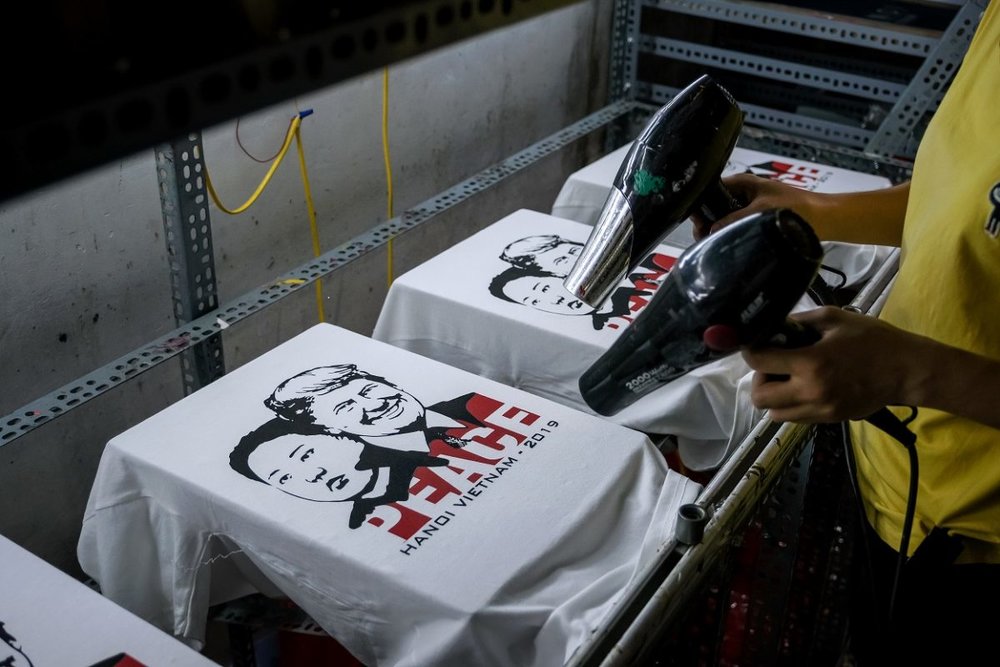
A worker at the t-shirt store of Truong Thanh Duc dry the newly printed t-shirts with the portraits of U.S. President Donald Trump and North Korean leader Kim Jong Un in Hanoi, Vietnam on Feb. 21, 2019. (Linh Pham/Getty Images)
Harry Kazianis, director of Korean Studies at the Center for the National Interest, said there could be three possible results for the summit.
“I think one that I would say is almost guaranteed is a peace declaration ending the Korean War, because it gives both sides a clear win. I think a lot has been talked about the Yongbyon facility, closure of the Yongbyon facility for something like sanctions relief,” Kazianis said. “The United States is not going be able to call it sanction relief because of the political realities here in Washington. But I think they will do something to relieve pressure off North Korea.
“Lastly, I think political liaison offices in Pyongyang and Washington are very important because it allows both sides to talk to one another. If you have no ability to talk to one another in the middle of a crisis, that’s really bad.”
Richard Johnson, Senior Director for Fuel Cycle and Verification at the Nuclear Threat Initiative; Former National Security Council, said that while North Korea has multiple goals to achieve, the United States has only one main goal.
“The U.S. goal has been very, very clear for many years, which is to see a North Korea that does not have any nuclear weapons, and is not a threat to the United States, or to its regional neighbors. The question is, how do you get there?”
Johnson thinks that a possible starting point could be the nuclear plants at Yongbyon, where there are a lot of different facilities, including a reactor and an enrichment plant.
“It is good to start with the production of uranium and plutonium, because that will fill a bomb. But once that is taken care of, you have to move to the next step, which could be the weapons themselves, the missiles that deliver them, and other parts of nuclear programs that are threats to the U.S. and the region, including chemical weapons and maybe even biological weapons, ” Johnson said.
Dr. Victor Cha, Senior Adviser and Korea Chair, CSIS, believes that the United States should push for some concrete results, and something new.
“The best possible outcome would be concrete steps taken by North Korea that indicate access to new facilities regarding their nuclear and missile programs, embedded in a commitment to a timeline and a declaration process that could then facilitate disablement and dismantlement,” Cha said in an interview after the CSIS event “Prospects for the Trump-Kim Vietnam Summit” on Feb. 22.
Doug Bandow, a senior fellow at the Cato Institute, is optimistic about a peace treaty, and thinks that President Trump should be given credit for that.
“President Trump believes very much in person-to-person diplomacy. And he is clearly willing to break with American traditions. That is, President Obama would never have considered a summit under these conditions.
“President Trump has shown that he is willing to break the mold, and try something new. And that has given this opportunity with Kim Jong Un to reach out and perhaps forge a real peace agreement. And I think President Trump deserves credit for that.”
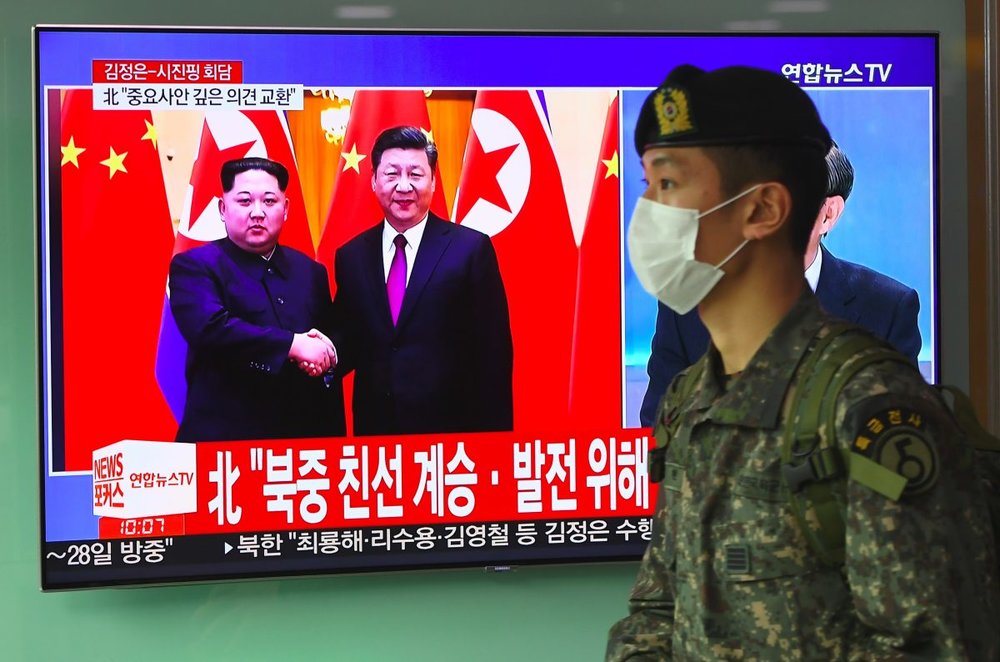
A South Korean soldier walks past a television news screen reporting about a visit to China by North Korean leader Kim Jong Un, pictured with Chinese leader Xi Jinping, at a railway station in Seoul on March 28, 2018. (JUNG YEON-JE/AFP/Getty Images)
In his second tweet on Feb 22, President Trump said, “President Xi of China has been very helpful in his support of my meeting with Kim Jong Un. The last thing China wants are large scale nuclear weapons right next door. Sanctions placed on the border by China and Russia have been very helpful.”
But experts are more skeptical about China’s role.
Kazianis said that the United States has had to depend on China regarding sanctioning North Korea.
“Essentially our maximum pressure policy of economic sanctions is almost entirely enforced by Beijing, because 90 percent of North Korea’s export goes through China. So if China wants to end maximum pressure in an afternoon, unfortunately it can do that by opening the border.”
Cha shares his view, and said that if China is really interested in making progress on North Korea, they can do either of two things.
“They would either cut off all economic cooperation with North Korea to force them to denuclearize. Or, they would provide a security guarantee, a nuclear umbrella to North Korea. Either of one of the extremes, if they are really serious about denuclearization.
“China can do either of these things; but they don’t do either of these things. They stay somewhere in the middle; and they put all the burden on the United States to do this. But the United States doesn’t have the same tools as China. China has the tools,” Cha said.
Chinese political and economic analyst Qin Peng said that while any normal person would understand that the denuclearization and economic development of North Korea would not only bring peace to China, but could also save the seriously declining economy of North-east China.
But why would the Chinese Communist Party (CCP) interfere with the peace process? Because for the CCP, its own rule and interests are above the interest of the Chinese and Korean peoples. An economically dynamic North Korea poses problems for the CCP’s stability that an impoverished North Korea does not. That is the reason why they would want to defend the totalitarian Kim regime.
Source: https://www.theepochtimes.com/speculation-mounts-about-trump-kim-summit_2815258.html
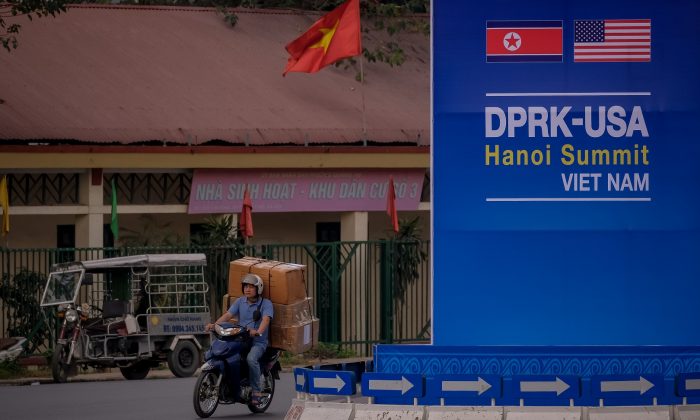
A public signboard welcomes the upcoming summit between U.S. President Donald Trump and North Korean Leader Kim Jong Un, near the U.S. Embassy in Hanoi, Vietnam on Feb. 21, 2019. (Linh Pham/Getty Images)
曾錚,女,法輪功學員,自由撰稿人,獨立中文作家筆會成員,聯合國跨宗教跨國家世界和平聯盟(IIFWP, Interreligious and International Federation for World Peace)和平大使,將於2月22日9:00到23日9:00絕食24小時,其中2月22日9:00-17:00在中共悉尼總領館前進行,其餘時間在家進行。
絕食聲明:
1、抗議中共建黨以來對全體中國人民的迫害和對中華文化的摧殘;
2、抗議中共對法輪功的罪行;
3、抗議中共對高智晟、郭國汀、郭飛雄、楊在新等所有維權律師和維權人士的迫害;
4、抗議中共對傳播《九評共產黨》的人士的迫害;
5、抗議中共對鄭貽春、張林、楊天水、師濤、杜導斌、清水君、蔡卓華、姜維平、程翔等因言獲罪的作家和記者的迫害;
6、抗議古狗、雅虎等西方公司助中共封鎖網絡;
7、抗議中共特務毆打大紀元技術總監李淵及其他大紀元義工的流氓行徑;
8、抗議中共打壓大紀元、新唐人、希望之聲等自由媒體;
9、抗議中共協迫澳洲外交部長唐納限制法輪功在澳大利亞的表達自由:
10、抗議中共在法輪功問題上對澳大利亞各級政府的施壓;
11、抗議中共對此次接力維權絕食運動參與者的迫害。
2006-02-16
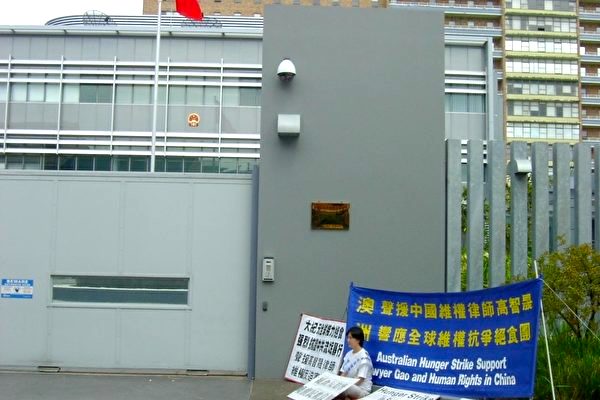
曾錚2006年2月22日中悉尼中領館前絕食靜坐。
【新唐人2016年01月22日訊】1月21日,美國神韻紐約藝術團在「娛樂之都」拉斯維加斯的演出讓觀眾耳目一新,振奮不已。一名第二次觀看演出的觀眾表示,為了能儘快看到神韻,她迫不及待的獨自前來,她希望神韻每年都來,她自己也會年年來。
註冊護士馬琳•漢樂(Marleen Hamre)說,神韻演出振奮人心而又超級棒。
註冊護士馬琳•漢樂:「演出讓我的心為之歌唱,從來沒有聽過這麼出色女高音的歌聲,如果我戴著眼鏡,我都覺得眼鏡會被震碎,我希望神韻能長久的來演出,我會推薦神韻,這比拉斯維加斯大道上任何演出都好。」
神韻演出讓她更加相信每個人都是天使。
註冊護士馬琳•漢樂:「我們人類不是從魚或甚麼猴子變來,我們肯定都是來自天上,乘駕自己的榮耀之雲而來,我們每一個人都是從天堂來的美麗天使。」
她也認為,神韻演出對孩子有長遠的教育意義。
註冊護士馬琳•漢樂:「他們長大了,可以記住中國文化,因為她太美了,我相信每個中國人,以及全世界的人都相信生命的永恆,相信善能盛行,善能戰勝邪惡。」
新唐人記者曾錚、袁科美國拉斯維加斯採訪報導
轉載自:https://www.ntdtv.com/b5/2016/01/22/a1248636.html
By Gerard Traub
The sky an endless ocean
beyond every tide and fathom
drowning me inside your vastness.
I surrender between here and horizons
where beauty with my own becoming
breathes moments into silence.